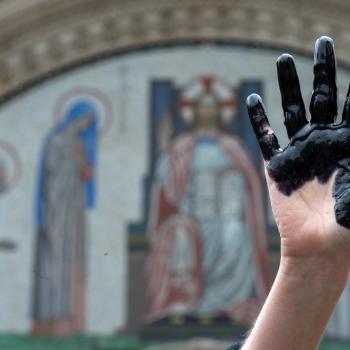
St. Catherine of Siena was revered for her mystical, indeed, prophetic connection to God; and like many prophets, she often spoke harshly against the religious authorities of her day, pointing out how they often lived their lives contrary to their vocation. Even the Pope could and would receive her criticism when it was necessary. Thus, she said that those who taught the faith should do so more than with their words, but with their lives; they should not be hypocrites, reprimanding people for sins which they themselves committed:
How can those who are so sinful bring their subjects to justice and reproach them for their sins? They cannot, for their own sins have left them bereft of any enthusiasm or zeal for holy justice. If they do sometimes attempt it, they make their subjects (who have become sinful along with themselves) say, “Doctor, treat yourself first; then treat me, and I will take the medicine you give me. Your sin is greater than mine, yet you condemn me!’ [1]
James said that we should not seek positions of authority, we should be weary of assuming a leadership position within the church and teach others through that position, because most responsibility comes as a result of that authority. Those who fail to meet their responsibility risk suffering grave consequences for their actions: “Let not many of you become teachers, my brethren, for you know that we who teach shall be judged with greater strictness” (Jas. 3:1 RSV). Clergy, of course, are meant to be teachers, and so if someone were to accept a position within the ecclesiastical hierarchy, they must be willing to accept the responsibility given to them, a responsibility which includes taking care of and showing love and concern for those whom they are to shepherd. Indeed, they should be just, following the expectations St. Ambrose used to indicate should be found in someone who would be just:
The just man does not know how to prefer himself to others; he does not even know to bend the rigidity of judgment in his own favor; he shudders at the memory of his own fall; and he blushes at his own error; he fears, he dreads, and he shrinks before every memory of it; he believes that it weighs heavy on himself; he flees from serving as his own judge; and he does not dare commit himself to himself, because he thinks no one more severe to him than the one from whom he cannot hide, whom he cannot deceive, whom he finds no way to flee and avoid, unless he should “deny his very self and take up the Cross” of the Lord.[2]
Those who serve as authorities in the church should focus on helping those whom they have been sent to guide and direct, showing them mercy and love. The person they should judge the most is themselves. They should fear to act unjustly, that is, they should be concerned not to fall away from the path of love as exemplified by the cross. They should realize that if they were to do so, then the power they have will be used against them, as they will one day stand in judgment for all they have done with it. Thus, either those with authority will be harsh on themselves, or they will glorify themselves at the expense of their flock, and the judgment that they bring upon others will be intensified before it is reflected back at them. The more they embrace injustice, the more they mistreat those whom they should embrace with love and mercy, the more they will suffer the consequences of their evil. And we should understand this is because sin causes its own condemnation by creating the conditions for that condemnation, or, as St. Jerome said, sin is itself the material by which the penalties of sin are formed:
For as long as there is the material of a corpse, and some fluid in the corpse, vermin are born out of the decay. In the same way, out of the very material of sins penalties are begotten. This is why, when death has been slain, to which the prophetic discourse was spoken through Hosea, “I will be your death O death; I will be your bite, O hell” [Hos 13:14] even the Apostle Paul says to it, “Where O death is your quarrel? Where O death is your goad?” [1 Cor 15:55]. For there is none dead to cut us down; for there will be no sin that needs to be cut down, because the goad of death is sin [cf. 1 Cor 15:56]. [3]
And so, Catherine pointed out religious leaders need to live out what they preach, and if they don’t do so, even if their words are right, they do wrong. “Those whose reprimands are only words unsupported by a good and well-ordered life are doing wrong. Not that they ought therefore to leave their subjects’ sins unreprimanded, good or evil though they themselves be. But they still are doing wrong in that their reprimand is not accompanied by holy and honorable living.” [4] They should not be hypocrites, judging others when they do the same or worse. They should speak the truth in mercy, a mercy which is found and had by those who live and act with justice. With such justice, they will be able to help promote the common good, because they will embrace it themselves, but without it, they will create the conditions for more and worse evils in the world, and therefore, grievous suffering for all:
All these evils, dearest daughter, come of not administering corrections out of one’s own good and holy living. Why do they not correct? Because they are blinded by their selfish self-centeredness. This selfishness is the source of all their evil doings. Subjects and pastors, clerics and religious alike, are looking out for nothing except how they can have all their perverse pleasures and pastimes. [5]
We must not seek private pleasure over justice and the common good; selfishness leads us to take more than what we need, and therefore, from the needs of others, leading them to suffer thanks to our want of justice. While this is true for all of us, it is especially true with people in positions of power and authority, because their actions tend to have greater ability to affect the common good than those without such power. Catherine understood this, even as she understood, if the clergy took their positions of authority seriously, and lived out their lives with the holiness which should go with the authority given to them, then the common good could be greatly increased in the world.
[1] St. Catherine of Siena, The Dialogue. Trans. Suzanne Noffke, OP (New York: Paulist Press, 1980). 240.
[2] St. Ambrose, “Defense of the Prophet David” in Treatises on Noah and David. Trans. Brian P. Dunkle, SJ (Washington, DC: CUA Press, 2020), 131.
[3] St. Jerome, Commentary on Isaiah in St Jerome: Commentary on Isaiah; Origen Homilies 1-9 on Isaiah. Trans. Thomas P. Scheck (New York: Paulist Press, 2015), 308.
[4] St. Catherine of Siena, The Dialogue, 240.
[5] St. Catherine of Siena, The Dialogue, 240.
Stay in touch! Like A Little Bit of Nothing on Facebook.
If you liked what you read, please consider sharing it with your friends and family!













